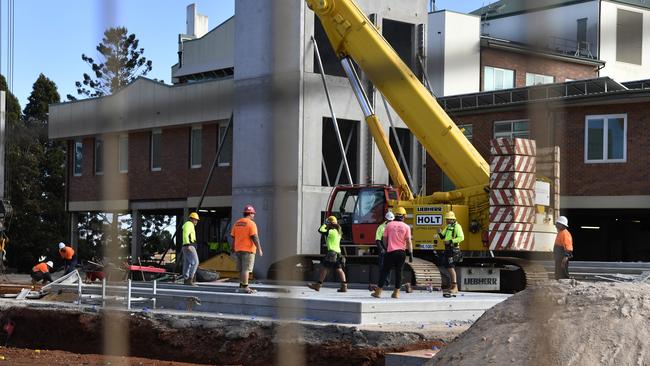Coronavirus: Builders’ blitz on penalties and casual shifts
Construction employers are pushing to scrap Saturday penalty rates and cut casual shifts to as few as two hours.

Construction employers are pushing to scrap Saturday penalty rates and cut casual shifts to as few as two hours, warning that up to one-third of businesses in the industry could shut down if conditions do not improve in the next year.
The bid to apply changes to “restrictive” industry awards for the rest of 2020, however, is being resisted by powerful construction unions, who have accused businesses of exploiting the coronavirus pandemic to attack workers.
The standoff between builders and unions comes as the Morrison government prepares to seek consensus for industrial relations changes and industry groups demand a minimum-wage freeze for the nation’s low-paid workers be imposed for 12 months.
As The Australian revealed on Monday, the government is also attempting to stave off a collapse in the construction industry, contemplating a major stimulus package that could include direct cash grants for home renovations.
David Plank, ANZ’s head of Australian economics, said the construction sector was “critical” to the economy.
Economists expect GDP figures to be released on Wednesday to show the economy shrank by 0.4 per cent over the first three months of the year, weighed down by the summer’s horror bushfires and the early weeks of the pandemic. It will be the first quarterly contraction since the Queensland floods slashed growth in 2011.
In a submission to the Fair Work Commission, Master Builders Australia, the Australian Industry Group and the Housing Industry Association have sought an array of award changes they insist are needed to overcome the impact of changes to work ¬practices imposed during the COVID-19 crisis.
The changes would allow employers and workers to agree that ordinary working hours would be 38 hours a week between 6am and 7pm on Monday to Friday and 6am and 2pm on Saturday. Minimum casual shifts would be reduced from four hours to two and workers would get time off instead of paid overtime.
Workers could be directed to take annual leave and employers would be able to reduce hours, including to zero, if a worker could not be usefully employed due to the pandemic and government restrictions.
According to their submission, the employer groups said 77,000 construction workers had either lost their jobs or been stood down as of May 2, while a recent survey of more than 400 builders found one-third of construction businesses would be forced to close over the next year if business conditions did not improve.
They said that, without any form of mitigation, the residential building industry faced “extensive lay-offs instead of a ‘bridge’ across the pandemic, and a prolonged slump instead of a V-shaped -recovery”. “Decisions need to be made today for when this fallout reaches on-the-ground activity,” the employer groups’ submission reads. “The risk of inaction is that another one of Australia’s key ¬industries ends up in freefall, well after the health crisis is over.”
Acknowledging that unions did not support the application, the submission notes that the current awards do not reflect the operational realities in which they operate.
“The circumstances warrant a variation to the minimum safety net that reflects a ‘trade-off’ between additional operational flexibilities against some employment benefits, with a view to maintaining the viability of employers and the ongoing employment of their employees,” the submission reads.
CFMEU construction division national secretary Dave Noonan said the union opposed the changes.
“The employer groups are proposing to reduce the minimum period of casual engagement to two hours, and proposing to introduce Saturday work with no penalty rates,” Mr Noonan said.
“Construction workers have co-operated with employers to keep the industry working while other industries shut down. But they won’t cop the pandemic being used to attack wages and conditions. That’s just opportunism.”
Master Builders Australia chief executive Denita Wawn said the industry was asking for the flexibility to reach agreement with workers “so that we can better respond to changes to work practices imposed by COVID-19”.
“Social distancing can mean slower work and potential delays to projects that could expose contractors to liquidated damages and this wouldn’t be good for anybody,” Ms Wawn said.
On Monday, Josh Frydenberg said dwelling investment was worth $100bn, or about 5 per cent of GDP. The Treasurer put the number of Australians employed by the construction industry at above one million.
The Reserve Bank estimates that just under 6 per cent of Australian workers rely in some way on the construction industry for their jobs, or about 750,000 jobs. About 260,000 workers are directly employed by the industry.
Mr Plank said the residential building sector would be a big drag on the economy over the next 18 months, as home builders faced a sudden drop in demand for new homes thanks to the hit to employment and incomes from the crisis.
More importantly the sharp fall in population growth due to closed borders would have a more profound impact, he added.
Meanwhile, the Australian Retailers Association has dumped its previous support for a 1.8 per cent pay increase for the nation’s low-paid, joining other employer groups in calling for a freeze in the minimum wage due to the economic impact of the COVID-19 crisis. However, the ACTU is standing by its claims for a $30-a-week increase, insisting that a substantial rise will help rather than hinder the economic transition from the pandemic.
The Australian Bureau of Statistics will on Tuesday release the first set of economic numbers for the week, providing data on company profits and net export numbers.
While economists expect a slide in GDP figures on Wednesday, any decline will be dwarfed by the significant fall, potentially as much as 9 per cent, forecast for the three months to the end of June as measures to restrict the spread of the virus closed down large swathes of the economy.
Analysts and policymakers remain hopeful, however, that growth will rebound firmly in the September quarter.
The Reserve Bank will also meet on Tuesday, with no cut to the official cut rate of 0.25 per cent expected. The bank last lowered rates at an emergency meeting in March.







To join the conversation, please log in. Don't have an account? Register
Join the conversation, you are commenting as Logout